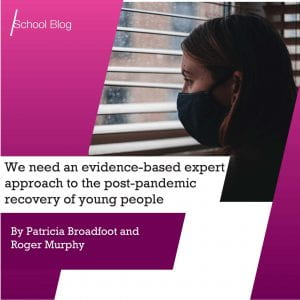 Blog post by Patricia Broadfoot, University of Bristol; Roger Murphy, University of Nottingham
Blog post by Patricia Broadfoot, University of Bristol; Roger Murphy, University of Nottingham
In December 2020, the Westminster government promised to set up an expert group to consider solutions to the huge variability of the impact of the coronavirus pandemic on pupils’ educational experiences and progress. Two months later the Department for Education (DfE) announced that plans for this group had been scrapped. Instead, the DfE has appointed an education recovery commissioner to focus on so-called ‘learning loss’. Two successive children’s commissioners, the head of Ofsted and many others have expressed serious concerns about the current situation. There has also been widespread disagreement about the best strategies to employ and the resources required.
We need the best possible expertise to identify the issues that must be addressed if children are to flourish. We need experts to provide an integrated picture of the challenges that children face, and to suggest appropriate ways of addressing them. Without such expertise children could suffer lifelong impacts, as argued by two children’s commissioners and in a report by the Institute for Fiscal Studies (Sibieta, 2021). That report drew the following conclusions, which reflect our key concerns.
‘The long-run costs of the pandemic will fall disproportionately on today’s children. Without significant remedial action, lost learning will translate into reduced productivity, lower incomes, lower tax revenues, higher inequality and potentially expensive social ills.
‘The lack of urgency or national debate on how to address this problem is deeply worrying. The necessary responses are likely to be complex, hard and expensive. But the risks of spending “too much” time or resources on this issue are far smaller than the risks of spending too little and letting lower skills and wider inequalities take root for generations to come.’
(Sibieta, 2021)
There is a pressing need for an educational equivalent to Sage (the government’s scientific advisory group for emergencies) with representation from experts such as clinical psychologists, who understand children recovering from traumas such as this one. Professor Cathy Cresswell of Oxford University and Naomi Fisher have stressed the need for both community-based and school-based remedial interventions, programmes designed to help young people engage with positive narratives about their experiences. Naomi Fisher (2021) has called for support for children to develop alternative narratives celebrating resilience and survival. Such narratives can be developed through art, drama and play, helping children to recover emotional and educational equilibrium in ways that extra hours of tuition may not.
‘We are a rich country with a wealth of scientific knowledge on all of these topics. Why wouldn’t we use this expertise at a time like this?’
Future policy development needs such specialist expertise to urgently address the impact of the ‘lost year of education’ on the most vulnerable children. Anne Longfield, former children’s commissioner, fears a ‘lost generation of vulnerable children’ who have suffered most during the pandemic. Lack of access to remote learning and highly disadvantaged home circumstances have excluded many thousands of children from schooling. Marcus Rashford, the Manchester United footballer, has highlighted the additional impact of malnourishment on top of the other challenges faced by many such children. The proposed education and children’s Sage should, therefore, include expertise on learning and mental health, pediatrics and nutrition. It should include contributions from child and family social work and educational sociology. We are a rich country with a wealth of scientific knowledge on all of these topics. Why wouldn’t we use this expertise at a time like this?
The government has claimed that it has been ‘following the science’ throughout the pandemic. In addressing the emotional, educational and physical challenges that the pandemic has imposed on our children, the government also needs to ‘follow the science’. The funds being set aside to tackle this challenge need to be both calculated and spent wisely. It is clear, therefore, that we need a ‘Sage for education and children’ and we need it now. A single education recovery commissioner simply will not do, though we are sure that he is doing the very best he can in such a challenging and complex situation. We need the government to recognise the necessity to call upon the research and expertise that exists in this field, just as much as it recognises the need to call on the advice of medical experts. We are calling for the creation of an expert group that will allow us to start following the science in this most crucial aspect of our nation’s future – before it is too late.
References
Fisher, N. (2021, February 15). Weathering the storm. The
Psychologist.
Sibieta, L. (2021, February 1). The crisis in lost learning calls for a massive national policy response [Blog post]. https://www.ifs.org.uk/publications/15291.
